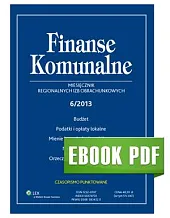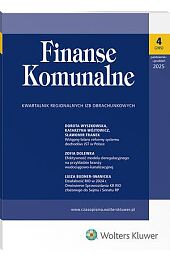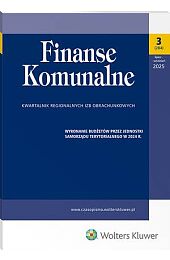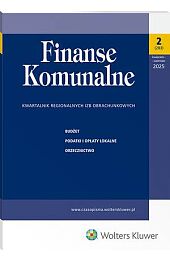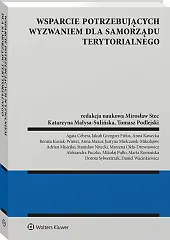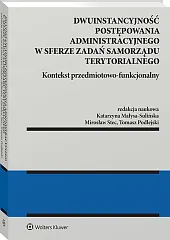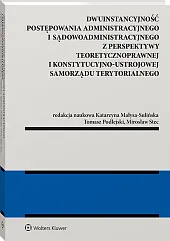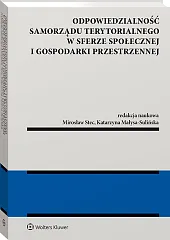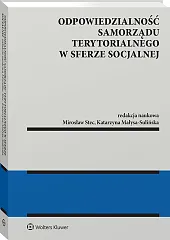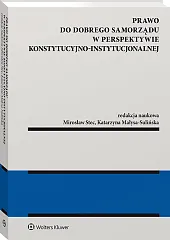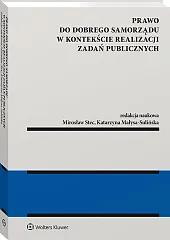ARTYKUŁY
Wojciech Gonet
str. 5
BUDŻET
Wioletta Bień
str. 22
PODATKI I OPŁATY LOKALNE
Arkadiusz Skomra, Paweł Daniel
str. 32
Bartosz Pawlak
str. 43
MIENIE I ZAMÓWIENIA PUBLICZNE
Jarosław Balcewicz
str. 50
NADZÓR I KONTROLA
Piotr Sołtyk
str. 55
DYLEMATY
Elżbieta Rogala
str. 67
ORZECZNICTWO
str. 69
Table of Contents & Abstracts
str. 79
Wojciech Gonet
Dotacja w systemie finansów publicznych - wybrane zagadnienia
Przedmiotem opracowania poświęconego dotacji, jako wydatku budżetowego i jednocześnie dochodu beneficjenta, jest m.in. analiza obowiązujących rozwiązań prawnych, a także kwestia przyszłości tej instytucji wydatkowej w systemie finansów publicznych i kierunków jej ewolucji. W artykule autor omawia pojęcie dotacji, szczegółowo analizuje rodzaje dotacji, co pozwala mu na wyciągnięcie wniosków de lege lata i de lege ferenda. Następnie autor koncentruje się na problematyce planowania dotacji, procesu udzielania dotacji oraz sposobów wykorzystania dotacji.
Początek strony
Wioletta Bień
Podmioty uprawnione do korzystania z dotacji oświatowych
W warunkach polskiego systemu prawnego zastosowanie dotacji oświatowej ma zróżnicowany charakter w zależności od rodzaju i typu dotowanego podmiotu. W artykule autorka analizuje przepisy prawne regulujące zasady przyznawania dotacji poszczególnym beneficjentom, wskazując różnice w tym zakresie, z jednoczesnym uwzględnieniem najważniejszych zmian znowelizowanej ustawy o systemie oświaty, dotyczących głównie szkół niepublicznych obowiązujących od 1.01.2013 r. Wyjaśnia przy tym pojęcie i rodzaje dotacji oraz najistotniejsze regulacje prawne w tym zakresie, wskazuje beneficjentów dotacji oświatowych, a także praktykowane nieprawidłowości ujawnione zarówno po stronie organu dotującego, jak i podmiotu otrzymującego dotację.
Początek strony
Arkadiusz Skomra, Paweł Daniel
Termin ustalenia opłaty adiacenckiej
Autorzy w opracowaniu podejmują próbę scharakteryzowania zagadnienia, w jakim możliwe jest ustalenie opłaty adiacenckiej. W szczególności ich celem jest zwrócenie uwagi na kwestie ustalania początku biegu terminu do ustalenia tej opłaty oraz jej momentu końcowego, który w zależności od podstawy prawnej ustalenia tej opłaty liczy się do dnia wydania decyzji ostatecznej lub wydania decyzji przez organ I instancji. Autorzy wyjaśniają również kwestie wpływu wyroku sądu administracyjnego uwzględniającego skargę na losy dalszego postępowania i możliwości wydania ponownej decyzji ustalającej opłatę.
Początek strony
Bartosz Pawlak
Stawka VAT w ofercie złożonej w 2013 r. na realizację zamówienia publicznego w 2014 r. - uwagi na tle art. 146a ustawy o podatku od towarów i usług
W tekście autor przedstawia, w jaki sposób należy ustalać stawkę VAT w ofercie składanej w 2013 r. w postępowaniu o udzielenie zamówienia publicznego realizowanego także w 2014 r. Wątpliwości budzi bowiem kwestia, czy należy uwzględniać okoliczność, że w zależności od tego, czy obowiązek podatkowy powstanie w 2013 r., czy w 2014 r., zastosowanie mieć będą różne stawki VAT. Przy ich rozstrzyganiu autor przywołuje poglądy formułowane przy okazji wprowadzenia nowych stawek podatkowych od 1.01.2011 r. oraz weryfikuje ich przydatność dla aktualnych problemów. Dodatkowo omawia możliwość zmiany umowy wówczas, gdy nie uwzględniono w niej w sposób prawidłowy stawek podatkowych.
Początek strony
Jarosław Balcewicz
Problemy zamówień na świadczenia zdrowotne
Zawarte w ustawie o działalności leczniczej wyłączenie z obowiązku stosowania przepisów o zamówieniach publicznych dotyczy stosunkowo wąskiego katalogu usług obejmujących wyłącznie świadczenia zdrowotne. Te ostatnie są definiowane jako działania służące zachowaniu, ratowaniu, przywracaniu lub poprawie zdrowia oraz inne działania medyczne wynikające z procesu leczenia lub przepisów odrębnych regulujących zasady ich wykonywania. Unormowany został zarówno sposób, jak i tryb zawierania umów na udzielanie świadczeń zdrowotnych. Autor podkreśla, że znowelizowane ostatnio przepisy są bardziej liberalne od regulacji obowiązujących w zamówieniach publicznych, które muszą być stosowane na pozostałe zamówienia (dostawy, usługi, roboty budowlane).
Początek strony
Piotr Sołtyk
Funkcjonowanie kontroli zarządczej w jednostkach samorządu terytorialnego w świetle ustaleń kontroli NIK
Tworzenie wewnętrznych systemów organizacyjnych wspierających osiąganie wyznaczonych celów jednostki, zapewnienie transparentności i rozliczalności wydatkowania publicznych zasobów finansowych są ważnymi i aktualnymi postulatami kontroli zarządczej. Instrumentem oceniającym adekwatność, skuteczność oraz efektywność systemu kontroli jest niezależny i obiektywny audyt wewnętrzny. Autor przedstawia w artykule wybrane ustalenia z kontroli Najwyższej Izby Kontroli, dotyczącej funkcjonowania kontroli zarządczej w jednostkach samorządu terytorialnego, ze szczególnym uwzględnieniem audytu wewnętrznego.
Początek strony
Elżbieta Rogala
Nieważna umowa z pominięciem procedury przetargowej z VAT
Choć może się wydawać, że umowa nieważna i bezskuteczna to to samo, a przez to nie powinny podlegać opodatkowaniu podatkiem VAT, to jednak jest między nimi różnica: umowa bezskuteczna, czyli nielegalna i zagrożona odpowiedzialnością karną, jest umową niepodlegającą podatkowi VAT. Natomiast umowa bezwzględnie nieważna - ale legalna - np. z pominięciem procedury przetargowej - podlega opodatkowaniu. Przytaczając wyrok NSA z 10.04.2013 r., autorka omawia to zagadnienie.
Początek strony
Krzysztof Radzikowski
Część budynku związana z prowadzeniem działalności gospodarczej jako przedmiot opodatkowania podatkiem od nieruchomości
Wyroki NSA z 14.08.2012 r. (II FSK 2444/10 i II FSK 2445/10)
1. Skoro zgodnie z art. 2 ust. 1 pkt 2 ustawy o podatkach i opłatach lokalnych przedmiotem opodatkowania mogą być "budynek lub jego część", to zgodnie z art. 1a ust. 1 pkt 3 tej ustawy związane z prowadzeniem działalności gospodarczej będą m.in. znajdujący się w posiadaniu przedsiębiorcy budynek lub jego część, chyba że budynek ten lub jego część nie są i nie mogą być wykorzystywane do prowadzenia tej działalności ze względów technicznych.
2. W sytuacji gdy podatnik nie zakończy budowy budynku, ale rozpocznie użytkowanie jego części, obowiązek podatkowy powstaje, zgodnie z art. 6 ust. 2 ustawy o podatkach i opłatach lokalnych, tylko w zakresie tej części budynku, a nie w zakresie całości. Z przepisu tego nie wynika bowiem, że związanie tylko części budynku z prowadzoną działalnością gospodarczą powoduje obowiązek opodatkowania najwyższą stawką podatkową całości budynku.
Początek strony


